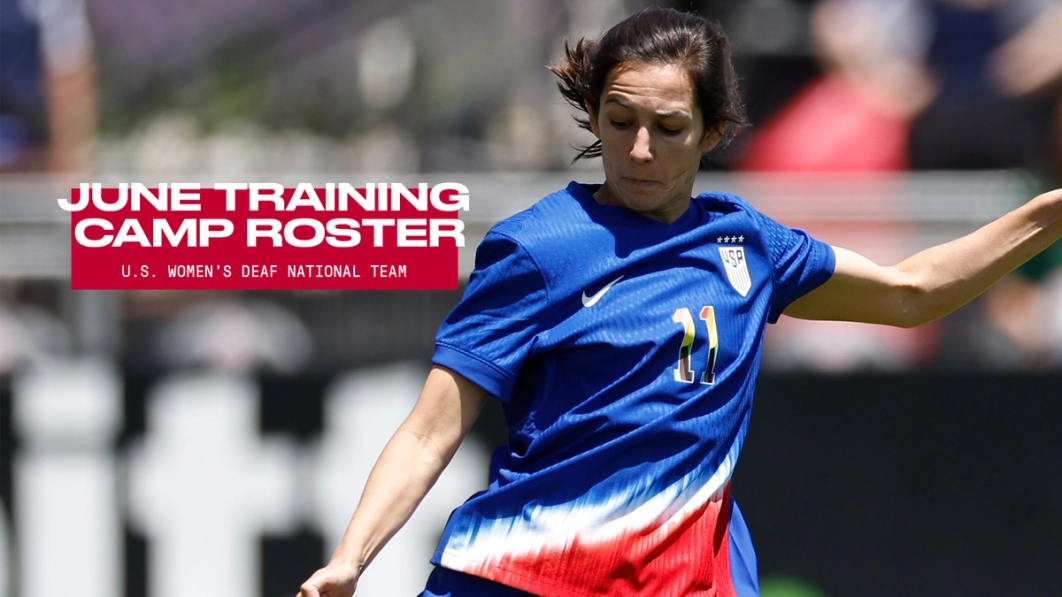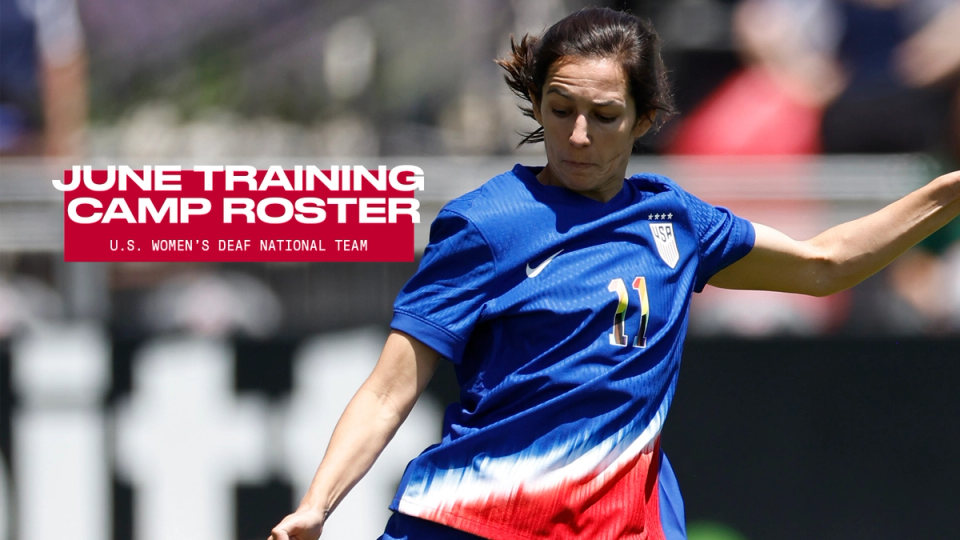ATLANTA (June 4, 2025) – U.S. Women’s Deaf National Team head coach Amy Griffin has selected 22 players for the team’s upcoming domestic training camp to be held from June 10-17 on the campus of the University of New Mexico in Albuquerque, N.M.
Preparing to defend its gold medal at the upcoming 2025 Deaflympics this November in Japan, the Deaf WNT convenes for the first time since the ADAPT and THRIVE Invitational, presented by Haleon, in March. The team looks to achieve their fifth Deaflympics gold in20 years.
“As we move closer to the Deaflympics, we've been intentional about building depth in every position,” Griffin said.“Over the past year, our focus has been on integrating young talent, and it's exciting to see how that investment is paying off. The blend of promising youth and our experienced veterans is allowing us to narrow our focus—sharpening how we attack and becoming more confident operating within two systems of play.”
Veteran goalkeeper Taegan Ferrin (Centerville, Utah) makes her return to the squad after giving birth in April of this year. The last time the goalkeeper played was in the historic 11-0 win against Australia in June 2024. The team features all five goal scorers from that match, including Emily Spreeman (Fountain Valley, Calif.), the team’s all-time leading goal scorer with 38 goals in 26 career caps. 2024 Female Deaf Player of the Year Sydney Andrews (Wichita, Kan.) and fifteen-year veteran Kate Ward (Atlanta, Ga.), the team’s highest-capped player, also make appearances on the roster.
Sixteen-year-old Chelsey Tumey(Peoria, Ariz.)and 15-year-old Tia LaBrecque (Raynham, Mass.)are young players who are quickly integrating into the squad. The pair made their debuts for the Deaf WNT in the team’s most recent matches -6-1 and 7-0 victories against Japan. Midfielder LaBrecque scored her first international goal for the team in the second match of the two-game series. The roster also boasts four goalkeepers, including two newcomers in Sierra Kaspar (Fort Worth, Texas) and Kaylie Whitmore (Renton, Wash.).
U.S. WOMEN’S DEAF NATIONAL TEAM ROSTER (Hometown; Caps/Goals):
GOALKEEPERS (4): Payton Degraw^ (Salt Lake City, Utah; 5/0), Taegan Ferrin^ (Centerville, Utah; 9/0), Sierra Kaspar* (Fort Worth, Texas; 0/0), Kaylie Whitmore* (Renton, Wash.; 0/0)
DEFENDERS (8): Sydney Andrews^ (Wichita, Kan.; 30/1), Paige Beaudry^ (Riverview, Mich.; 12/1), Josephine Blazic (East Tawas, Mich.; 1/1), Erin Cembrale^ (Oyster Bay, N.Y.; 13/5), Casey King^ (Bexley, Ohio; 8/5), Melia Lenert (Long Beach, Calif.; 2/0), Chelsey Tumey (Peoria, Ariz.; 2/0), Faith Wylie^ (Decatur, Texas; 13/6)
MIDFIELDERS (8): Gracie Fitzgerald^ (Georgetown, Ind.; 20/4), Holly Hunter^ (Temecula, Calif.; 6/7), Ani Khachadourian^ (Cary, N.C.; 10/8), Tia LaBrecque (Raynham, Mass.; 2/1), Paris Price^ (Fall City, Wash.; 14/2), Sabina Shysh^ (Tuscon, Ariz.; 4/1), Kate Ward^ (Atlanta, Ga.; 31/8), Mia White^ (Littleton, Colo.; 14/1)
FORWARDS (2): Emily Spreeman^(Fountain Valley, Calif.; 26/38), Sophie Post^ (Murray, Utah; 14/9)
^Part of squad at 2023 World Deaf Football Championships
*First Deaf WNT roster appearance
A LEGACY OF SUCCESS FOR DEAF WNT
The Deaf WNT took its initial steps in 1999, when the first U.S. side won the St. John’s Tournament, a small-sided competition played in London, England. Two years later, the team was again victorious at 2001 De Hearne Kortrijk Indoor Tournament in Belgium. Those two competitions laid the groundwork for the modern U.S. Women’s Deaf National Team which began competing in 11-a-side competition at the 2005 Deaflympics in Melbourne, Australia.
Since that time, the Deaf WNT has gone a remarkable 40W-0L-1D in 41 all-time international matches, outscoring its opponents 201-16en route to winning four Deaflympics (2005, 2009, 2013 and 2022) and three World Deaf Football Championships (2012, 2016 and 2023). And what about that one draw in their record? That came in the 2022 Deaflympics Final, when the USA tied Poland 2-2, claiming its fourth gold medal by winning 4-2 on penalty kicks.
COACHED BY CHAMPIONS
The team is led by two world champions in head coach Amy Griffin and assistant coach Joy Fawcett. The pair helped the U.S. Women’s National Team take home the first FIFA Women’s World Cup in 1991, while Fawcett also represented the U.S. at the 1995, 1999 and 2003 tournaments, winning another World Cup in 1999. Fawcett also won gold medals with the USWNT at the 1996 and 2004 Summer Olympics.
ABOUT DEAF SOCCER
Out of the five disciplines that make up U.S. Soccer’s ENT programming, Deaf Soccer holds the closest resemblance to the standard game, with only two main rules that differentiate it. First, the sport is contested by Deaf and hard-of-hearing athletes, with qualifying players needing to have a hearing loss of at least 55 decibels in their “better ear”. All players competing in Deaf matches must remove all hearing aids before playing.
Secondly, referees have a flag which they raise along with blowing their whistle to provide a visual cue for players to know when play has stopped. Aside from those two adaptations, Deaf Soccer follows the standard 11-a-side Laws of the Game governed by the International Football Association Board.
ABOUT THE U.S. SOCCER FEDERATION
Founded in 1913, U.S. Soccer, a 501(c)(3) nonprofit, is the official governing body of the sport in the United States. Our vision is clear; we exist in service to soccer. Our ambition, working across the soccer ecosystem, is to ignite a national passion for the game. We believe soccer is more than a sport; it is a force for good. We are focused in three areas: Soccer Everywhere, ensuring everyone, everywhere experiences the joy of soccer; Soccer Success, our 27 National Teams and pro leagues winning on the world stage; and Soccer Investment, maximizing and diversifying investments to sustainably grow the game at all levels. For more information, visit ussoccer.com/ourvision.






